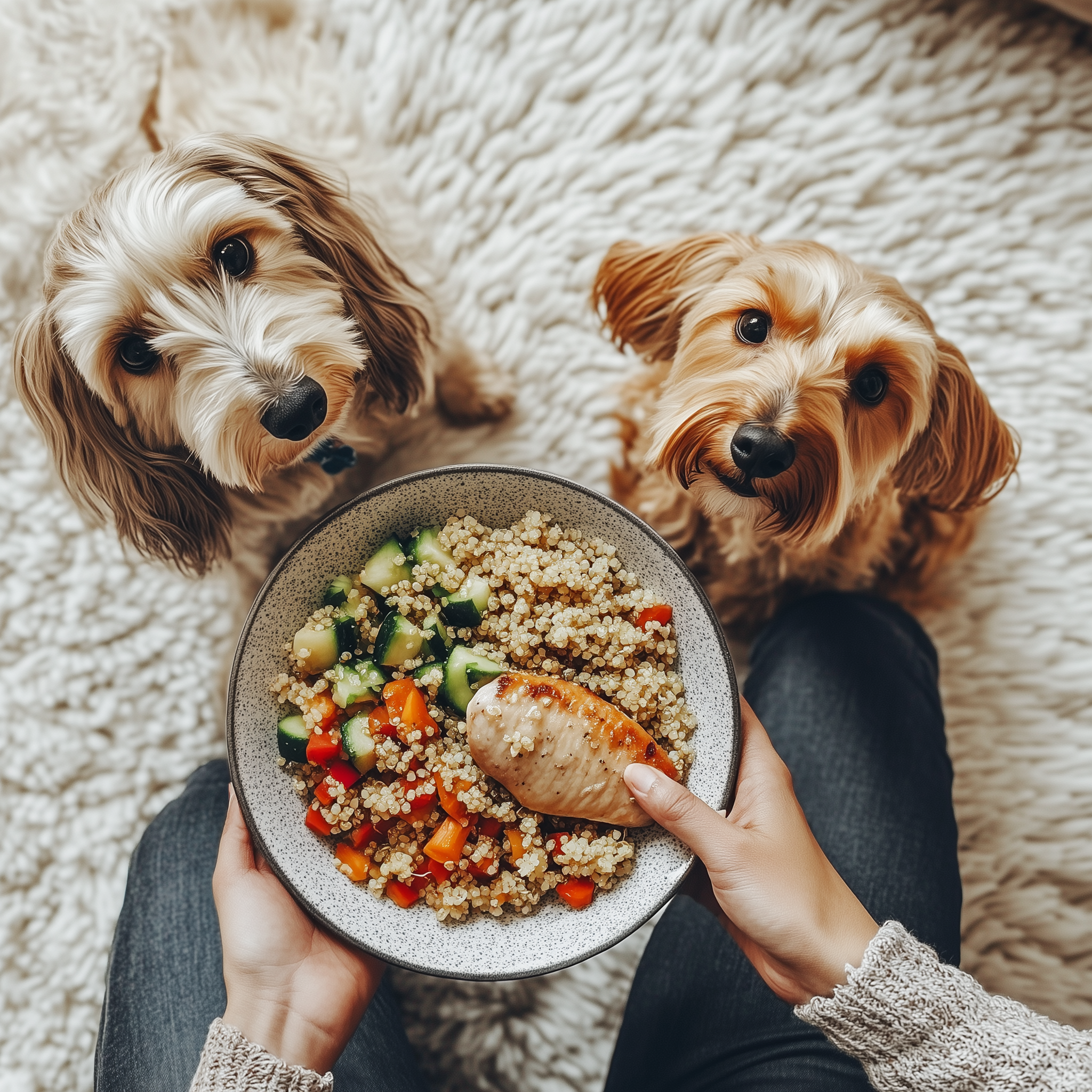
Why You Should Avoid Feeding Home-Cooked Meals to Your Pet
More and more pet owners are asking, “Is homemade food good for pets?” While the idea of cooking your furry friend a meal from scratch can feel loving and wholesome, the reality is that home-cooked food for pets often lacks the balanced nutrition they truly need unless it’s formulated with veterinary guidance. In this guide, we’ll debunk pet nutrition myths, explore the risks of feeding home food to pets, and offer safer, science-backed solutions for daily meals.
1. Understanding the Rise of Homemade Pet Food
What’s behind the homemade food trend?
From viral social media recipes to health-conscious pet owners wanting control over their pet’s diets, home-cooked meals seem appealing. The logic is simple: If homemade is healthier for humans, it must be healthier for animals too, right? .But the nutritional requirements of pets, dogs and cats in particular are more complex than our own. They need precise ratios of protein, vitamins, minerals, and even certain amino acids that aren’t always present in a typical “people food” recipe.
Key Insight: Without a veterinary nutritionist’s input, it’s easy to overlook crucial nutrients or inadvertently include harmful ingredients.
2. Is Homemade Food Good for Pets?
Why it’s not always the ideal choice
- Imbalanced Nutrition: Pets have unique dietary needs. A slight calcium or phosphorus imbalance can lead to bone issues, while too few amino acids can affect muscle and organ health.
- Unknowingly Harmful Ingredients: Common pantry items like onion or certain spices can be toxic to pets. Even “harmless” items, like grapes or chocolate, are dangerous for dogs.
- Time & Expertise Required: Formulating a balanced meal involves more than boiling chicken and rice. Nutrient profiles must be carefully monitored.
Practical Tip: If you’re set on a home-cooked approach, work closely with a vet or certified pet nutritionist to design a safe, balanced meal plan.
3. Risks of Feeding Home Food to Pets
What could go wrong?
- Nutrient Deficiencies: Long-term deficiencies can lead to brittle bones, poor coat quality, or organ stress.
- Overfeeding: Homemade diets often pack hidden calories, potentially leading to obesity or weight-related issues.
- Foodborne Illnesses: Cooking mistakes, undercooked meats, or poor storage may expose pets to bacteria like Salmonella or E. coli.
- Allergy Complications: Certain proteins or grains can trigger skin irritations or digestive upset, particularly if you’re guessing ingredient amounts.
4. Debunking Pet Nutrition Myths
Which myths keep circulating about home-cooked pet food?
- “Pets need variety like humans do.” While variety can be good, abrupt changes or random ingredients can shock a pet’s system.
- “Natural, whole foods always trump commercial diets.” High-quality commercial diets are scientifically balanced to meet daily nutrient needs. “Natural” doesn’t always equate to “safe.”
- “Homemade diets are cheaper.” Specialized ingredients and supplements for pets can end up costing more and the time investment is significant.
Expert Note: Many pet food brands invest in research and feeding trials to ensure consistent nutrient balance something a home cook rarely has the resources to replicate.
5. Safer Alternatives & Practical Tips
What are healthier, simpler options for daily feeding?
- Reputable Commercial Pet Food: Look for brands that undergo feeding trials and display AAFCO or equivalent certifications. For pets with specific health conditions requiring tailored nutrition, veterinarians often prescribe specialized diets. You can read more about this in our guide: Everything You Need to Know About Prescription Diets for Dogs and Cats.
- Vet-Approved Supplements: If you’re keen to add fresh elements (like cooked veggies or lean meats), consult your vet on portion sizes and potential supplements to avoid deficiencies
- Limited Ingredient Diets: Ideal for pets with food sensitivities, these diets eliminate guesswork by focusing on a single protein source or carbohydrate.
Bonus Idea: Instead of full home-cooked meals, give your pet an occasional treat of plain cooked meat or dog-safe vegetables just a few pieces to supplement (not replace) their balanced commercial diet.
6. Questions to Ask Before Home-Cooking
Before you begin making home-cooked food for pets, consider:
- Have I consulted a vet or pet nutritionist for guidance?
- Do I have reliable recipes specifically formulated for dogs or cats?
- Am I prepared to spend extra time measuring out proteins, carbs, fats, and supplements accurately?
- What’s my contingency plan if my pet shows signs of nutrient deficiency?
If these questions raise any doubts, it’s safer to rely on a premium commercial pet food brand with proven nutritional research.
Conclusion:
Why Home-Cooked Meals Aren’t Always Best
Is homemade food good for pets?
It can be, if done with meticulous planning and professional input. But for most busy pet parents, the risks of feeding home food to pets outweigh the convenience or perceived benefits. Missing out on critical nutrients or accidentally including toxic ingredients can harm your pet’s health in the long run.
Ultimately, balancing your pet’s diet is a job for experts. A well-formulated commercial pet food tailored to your pet’s age, size, and activity level provides consistent, science-based nutrition. If you still crave a personal touch, talk with your veterinarian about adding safe, vet-approved ingredients to your pet’s diet in moderation. That way, you get the best of both worlds: a well-fed, content pet and peace of mind about their long-term well-being.
Disclaimer:
This blog offers general advice and doesn’t replace professional veterinary recommendations. Always consult a qualified veterinarian or a certified pet nutritionist for personalized advice on your pet’s dietary needs.
